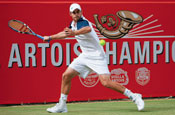The official explanation is that governing body the Lawn Tennis Association wants fewer sponsors (10 rather than the current 48) to support a package of events rather than just one. After investing £50m in the Artois Grass Court Championship and gaining considerable profile as a result, Artois now wants to take 'a different strategic direction,' according to an InBev spokeswoman.
'The timing has probably worked out well for Artois,' says Clifford Bloxham, vice-president of athletes and personalities at Octagon. 'It has been an outstanding sponsorship for it, and it is no bad thing to quit while you are ahead. You assume that Queen's will remain the UK's second most-important tournament after Wimbledon, but there is now a very strong event in Germany in the pre-Wimbledon fortnight. Roger Federer played there last year instead of at Queen's, and if the world's number two, Rafael Nadal, decides to do the same, that could undermine Queen's status.'
Other observers, however, believe the tie-up might have outlived its usefulness years ago. 'People automatically associate it with Artois, but as the years go by, the benefits diminish,' says David Farrow, managing director of Ogilvy Action Sports and Entertainment.
Others, still, question the basic logic of the sponsorship. 'Tennis never fitted the Stella brand; if it had, it would have done more tennis sponsorship,' says one. 'It only came about because Frank Lowe [then head of ad agency Lowe, which still handles Artois' advertising] was on the Queen's Club committee and thought it would be a good idea.'
The question now is where Artois will take its sponsorship strategy next. While it has 'very exciting plans in the pipeline,' according to the InBev spokeswoman, it is playing its cards close to its chest. In the meantime, it will upweight its investment in advertising. Its current campaign, using the strapline 'Pass on something good', promotes the family of Artois beers, including the Peeterman and Eiken brands, as well as Stella. But Artois seems to be suffering an identity crisis, which it will need to resolve if future sponsorships are to succeed.
The introduction of the Artois umbrella brand is seen by drinks analysts and brand experts as a way of diverting attention away from the negative associations that have built up around Stella. Price discounting, combined with a high alcohol content (5.2%), undermined the lager's premium positioning. Its association with lager louts, which earned it the nickname 'wife-beater', was even more damaging.
The recently introduced Eiken has a lower alcohol content (4.5%) than Stella or Bock (6.2%), the beer it replaced in the UK, and InBev hopes it will reinforce the brand values of heritage, craftsmanship and 'premiumness'. But the InBev spokeswoman insists that Stella remains the flagship brand and that advertising and future sponsorships will focus on it.
'InBev is trying to dilute the Stella brand while extending it, which is a very tricky thing to do,' says Paul Curran, alcoholic drinks analyst at Euromonitor.
Bloxham believes a carefully thought-out strategy, using different brands for different events, could help Artois communicate a more complicated message. However, the choice of sponsorship vehicle with which to do that is limited. 'If it goes for an Olympic sport, how will it dove-tail what it does now with London 2012?' asks Bloxham. 'If a non-Olympic sport, how will it achieve standout?'
Curran points out that not only are most of the big music sponsorships already accounted for, if Artois is seen as overtly targeting young people, it could find its image tarnished even further.
That leaves film, and sponsorship experts are bemused as to why Artois has reduced its involvement in this area. Last year Stella Artois pulled its sponsorship of Channel 4 films after nine years and was replaced as the official beer of the London Film Festival by Cobra.
'It had a real foothold in film, an area that is far less cluttered than sport or music, and could have built on that,' says Farrow. The InBev spokeswoman, meanwhile, insists that 'film remains part of our long-term strategy'.
Whatever that strategy turns out to be, observers will be watching keenly. As sponsorships go, the Artois Championships will be a hard act to follow.


